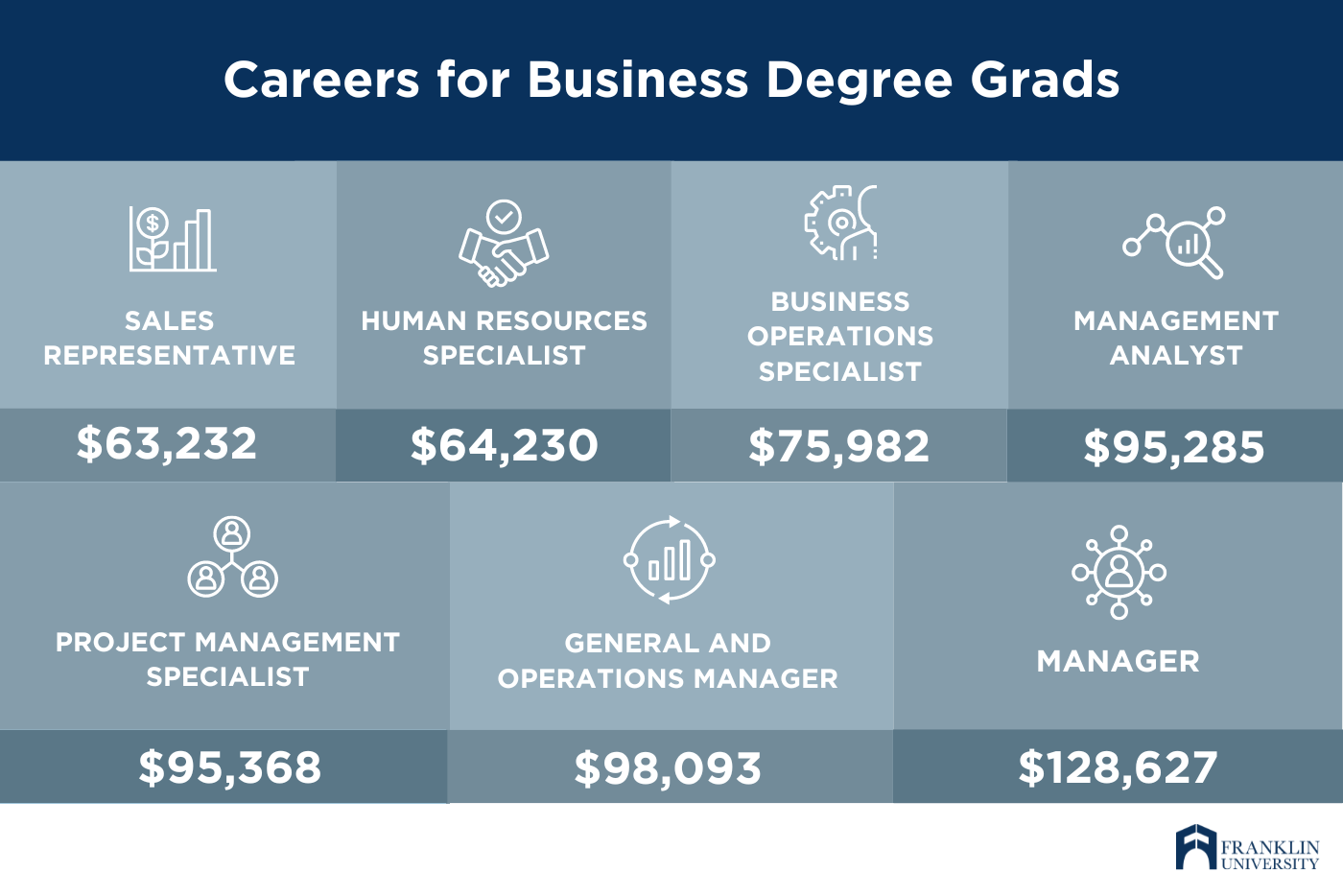Request Information
We're Sorry
There was an unexpected error with the form (your web browser was unable to retrieve some required data from our servers). This kind of error may occur if you have temporarily lost your internet connection. If you're able to verify that your internet connection is stable and the error persists, the Franklin University Help Desk is available to assist you at helpdesk@franklin.edu, 614.947.6682 (local), or 1.866.435.7006 (toll free).
Just a moment while we process your submission.

Is a Business Degree Worth It?
Even if you already have a career in business and know what a business degree is, you’ve no doubt wondered whether or not you really need a business degree.
Perhaps you’re thinking about going back to college but don’t want to pause your career. Or maybe you’re thinking you could work and go to school, but aren’t sure if a bachelor’s in business degree is what you need to give you an entry into better or different career opportunities.
Here’s a look at what a business degree really is, what it takes to earn it and, more importantly, how it could change your career for the better.
What Is a Business Degree?
A business degree is an undergraduate degree that equips you with foundational knowledge across the functions of business, ranging from accounting and finance to marketing and human resources. Because it’s so versatile and broad-based, a bachelor’s in business degree can prepare you for a lifetime of career opportunities in just about any field or industry that interests you.
While a business degree can refer to a degree in business management or leadership, typically it refers to a B.S. in Business Administration. This is the most comprehensive and flexible business degree program.
When it comes to educational focus, you can get a generalist business degree or a specialist business degree. A B.S. in Business Administration is a generalist degree because it emphasizes the broad range of business functions. A B.S. in Accounting, on the other hand, is an example of a specialized business degree because it focuses on only one aspect of business.

What Kinds of Jobs Can You Get with a Business Degree?
If you don’t have a business degree, you might want to reconsider. According to labor market analytics firm Lightcast, a business degree can open up more than 21.9 million job postings with a national median salary of $71,687.
Here’s a look at some of the many jobs you can pursue with a bachelor’s in business degree, along with the corresponding national median salaries according to Lightcast:
When it comes to paying for school, grants are among your best options. But do you know how to find them? Remove the guesswork by downloading this free guide

Don’t Fall for These 4 Business Degree Myths
Of course, there isn’t just one path to success with any degree, including a business degree. If you want to achieve your career goals, however, you’ll want to avoid unnecessary detours and wrong turns like these.
1. My experience plus a certificate is the same as getting a bachelor’s degree.
“A bachelor’s degree provides both immediate and lifetime value that’s unmatched by lower-level credentials,” says Doug Ross, Ph.D., business administration program chair, at Franklin University. “When you look at the lifetime earnings of a bachelor’s degree holder versus someone with a high school diploma, a bachelor’s degree holder earns over $1 million dollars more. You can also leverage a bachelor’s degree for a near-term pay raise that outrivals a certificate.”
2. There aren’t enough jobs for business grads.
“The idea that business graduates are unemployed or underemployed, I think, is based on a narrow view of what you can do with a business degree,” says Dr. Ross. “It really is one of the most flexible degrees you can have because you can apply it in any industry. Whether you work in oil & gas, technology, healthcare, or some other industry, business graduates are always needed. I tell students to stop looking for job titles like ‘business manager’ because it limits their options.”
3. A business degree is not as valuable as a specialized degree.
“This is another myth that’s taken hold in the wake of an influx of specialized degrees,” says Dr. Ross. “Yes, a business degree is general. That’s its strength, though, not its weakness. Businesses need people who can understand every function of a business and the impact each function has on another. A business degree will give you a holistic perspective that fuels collaboration within any organization. It’s also good for the graduate, giving you incredible career flexibility so you can transition between roles and across business functions. If you’re really wanting more in-depth knowledge in a particular area of interest, the best solution is a business degree that offers a minor in that specialty.”
4. I don’t need a bachelor’s in business since I have my associate degree.
“If you already have an associate degree, getting a bachelor’s can feel like starting over,” explains Dr. Ross. “With the right business degree program, you won't have to. Find a program that maximizes the credits you’ve already earned and seamlessly transfers them toward your bachelor’s degree. At Franklin, we help individuals with associate degrees transfer up to 94 credit hours into our bachelor’s program so they can get their business degree faster.”
What Does It Take to Earn a Business Degree?
Earning a business degree is going to require a fair amount of your time, energy and finances. Hopefully, the return on your investment of these resources will be worth it to your future.
Time
The amount of time it will take to get your business degree depends on you and your program. In terms of credit hours, you’ll need around 124 credit hours to earn a B.S. Business Administration. For a traditional, on-campus student, that works out to about four years. For a busy, working professional with transfer credit and a flexible course load, well, you could finish faster. So, if you want to earn your bachelor’s in business even faster, look for a business degree program that lets you maximize both your education and experience.
Energy
Getting your degree is more than just a time commitment. To be successful, you have to make your degree a priority—and that means adjusting your professional commitments and personal life to make room for your studies. It also means knowing yourself well enough to know when your best hours of the day are. To give you more time over your degree program schedule, you might want to consider enrolling in a 100% online business degree program.
Finances
The cost of a business degree varies widely, based on the school you choose, their program, and even where the school is located. For some, tuition costs can cause sticker shock, but keep in mind that the proverbial “advertised price” may not be what you actually pay. Most online colleges charge a cost-per-credit hour, so see if you can transfer credits to cut your tuition costs way down. Investigate your financial aid eligibility. You might just find you can get some free or low-cost funds to help pay for your degree.
Is It Worth It? The Choice Comes Down To Your Career Aspirations
If you are a working professional who wants to advance your career in business, a business degree can be a gamechanger.
A business degree can increase job prospects, create advancement opportunities, and increase your salary and lifetime income. It’s a worthwhile investment in your career—now and into the future.
You just have to find the right business degree program for you. Ready? Start here.





